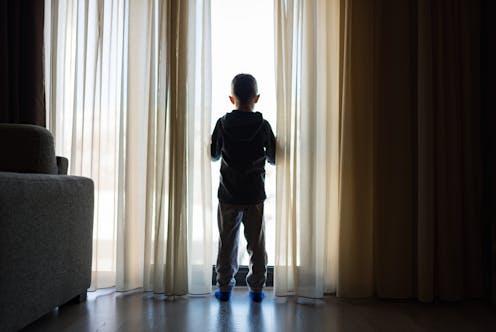Everyday ethics: I'm worried allowing my son to stay with his mom might increase my risk of getting
Social distancing can be especially hard when it comes to where children of divorced couples should stay – especially when one of the parents has illnesses that puts them at high risk of thcoronavirus.


A lot of people are facing ethical decisions about their daily life as a result of the coronavirus. Ethicist Lee McIntyre has stepped in to help provide advice over the moral dilemmas we face. If you have a question you’d like a philosopher to answer, send it to us at us-ethicalquestions@theconversation.com
I am a 58-year-old man with hypertension, high cholesterol and prediabetes. A divorce court ordered that my 9-year-old son spend every other weekend with his mother, who lives in a group home and relies on public transportation. She suggested that he stay with me during the pandemic but now wants him for a few hours a week. I am worried about the risk to my son and myself. I am also concerned that the court may order visitation regardless of the pandemic. What are the moral and ethical issues of this whole situation? – name withheld
The primary ethical issue here is what is best for your son – and, of course, for you, as someone who has a number of underlying health conditions that would make it dangerous for you to expose yourself to the risk of COVID-19.
It sounds like you have legal custody of your son. Presumably you could not, therefore, simply choose to have him stay with his mother for the duration of the pandemic, in order to protect your own health. And, as you state, your son’s health too could be at issue if he were to spend even part of his time in a group home or on public transportation.
I wonder if your soon-to-be ex-wife is considering what is best for your son in this situation? You say that at some point she suggested that he stay with you, presumably due to her concerns over his welfare. It is therefore puzzling why she would now change her mind, and put her own desires ahead of his safety. Eighteenth-century philosopher Immanuel Kant was suspicious of the corrosive effect of inclination – one’s own desires – when trying to make a moral decision.
One final consideration here is what your son wants. Has he told his mother that he does not want to be exposed to greater risk from the coronavirus? Does he even understand the risk factors involved? Is he happy with their current technology-mediated communications?
As you note, this is not merely an ethical question but a legal one. Socrates taught that false knowledge was more dangerous than ignorance, for it led to the sort of hubris where one might pretend to know an answer where one does not. As a philosopher, my best advice is to get a lawyer.
[You need to understand the coronavirus pandemic, and we can help. Read The Conversation’s newsletter.]
Lee McIntyre does not work for, consult, own shares in or receive funding from any company or organization that would benefit from this article, and has disclosed no relevant affiliations beyond their academic appointment.
Read These Next
Under the influence and under arrest − what happens if you’re drunk in the interrogation room?
Legal psychology researchers are investigating how police treat drunken suspects, how impaired people…
Cybersecurity researchers spotlight a new ransomware threat – be careful where you upload files
Modern web browsers are increasingly becoming like virtual computers, able to send email and play music…
Philadelphia has a lot more deadly shootings than expected for a big city − and NYC is much safer, n
Philadelphia has a high rate of gun homicides despite having relatively few gun owners and gun stores…





